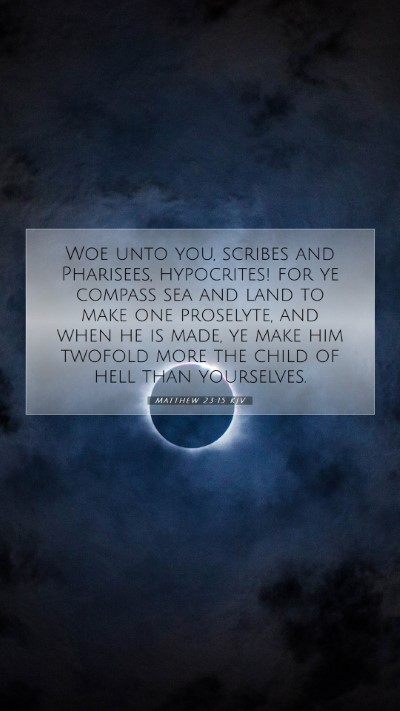Understanding Matthew 23:15 - Bible Verse Interpretations and Insights
In Matthew 23:15, Jesus addresses the Pharisees, condemning them for their hypocritical practices and the ways they mislead others. This verse encapsulates a core theme of Jesus' ministry: the distinction between true spirituality and religious pretense. Through the reflections of various public domain commentaries, we gain deeper insights into its implications. Here, we will delve into the meaning of this Bible verse, explore its interpretations, and highlight its significance for contemporary readers.
Verse Text
"Woe unto you, scribes and Pharisees, hypocrites! For ye compass sea and land to make one proselyte, and when he is made, ye make him twofold more the child of hell than yourselves." - Matthew 23:15 (KJV)
Bible Verse Meaning
Matthew 23:15 serves as a stern warning against the dangers of hypocrisy and misguided zeal. Here are key elements of its meaning:
- Condemnation of Hypocrisy: Jesus openly criticizes the Pharisees for their duplicity. They appear righteous but lead others astray.
- Efforts to Convert: The phrase "compass sea and land" signifies their great efforts to convert others, yet their convert becomes a more devout follower of misguided practices.
- Spiritual Consequences: The outcome of their actions results in making "the child of hell" even more lost than before, highlighting the severe spiritual ramifications of misleading others.
Commentary Insights
Matthew Henry's Commentary
Matthew Henry emphasizes the contrast between genuine faith and mere outward appearances, noting that the Pharisees' extreme devotion to converting others was ultimately fruitless. He reflects on how their misguided teachings only deepen the spiritual depravity of their converts, warning readers to pursue authentic faith rather than just appearances.
Albert Barnes' Commentary
Albert Barnes notes that the Pharisees' zeal to make proselytes was misdirected, focusing on external adherence to the law instead of inner righteousness. He elaborates on the term "twofold more" by explaining that such individuals adopt not only the Pharisees' practices but also their resulting judgment and condemnation. This serves as a dire warning against leading others into error.
Adam Clarke's Commentary
Adam Clarke offers insights into the cultural context of the Pharisees’ activities, further explaining that their zeal was often rooted in a desire for status rather than genuine concern for the conversion of souls. He highlights the grave implications of converting someone to falsehood, illustrating that this was equivalent to exacerbating their spiritual condemnation.
Application of the Verse
The lessons of Matthew 23:15 are vital for contemporary believers:
- Evaluate Religious Practices: Assess our own practices and beliefs to ensure we are not leading others astray through hypocrisy.
- Pursue Authentic Faith: Strive for a relationship with God based on truth and authenticity, rather than mere observance of religious rituals.
- Influence with Care: Recognize the weight of our influence over others, being mindful of the teachings we impart.
Cross References
- Matthew 15:14: Jesus speaks similarly about the blind leading the blind.
- Luke 11:52: Woe to you experts in the law for taking away the key of knowledge.
- Romans 2:24: The name of God is blasphemed among the Gentiles because of you.
Conclusion
In summary, Matthew 23:15 is a profound reminder of the importance of integrity in faith and the dangers of leading others astray. By engaging with Scripture through thoughtful analysis and commentary, believers can discern not only the surface level of biblical messages but also their deeper spiritual implications. Let this verse inspire us to pursue genuine faith and guide others in truth.
Further Bible Study Resources
- Online Bible study tools for deeper insight.
- Bible study guides to explore contexts and interpretations.
- Bible study lessons to apply teachings to daily life.
For a comprehensive understanding of Scripture and its application, utilizing various Bible study topics and plans is beneficial. This allows for an in-depth Bible verse analysis and a more profound connection with God’s word.


